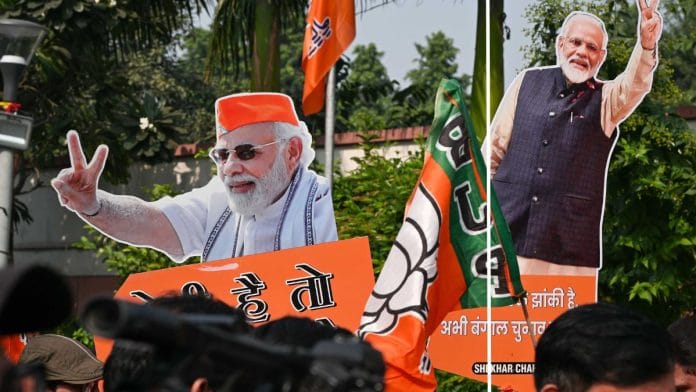Nitish Kumar is likely to be sworn in as the Bihar Chief Minister for the 10th time. Top BJP leaders such as Prime Minister Narendra Modi and chief strategist Amit Shah might have been ambivalent on this issue in the run up to the election but the nature of the verdict is such that they will find it difficult to deny Kumar another term. Not because he has enough numbers to make another political somersault, but because he has got the people’s mandate for another term. Be it the Rs 10,000 dole to 1.40 crore Jeevika Didis or his continuing hold on female voters, sections of the extremely backward classes, Dalits and other backward classes, nobody can deny credit to Nitish Kumar for such a historic verdict in favour of the National Democratic Alliance.
Having said that, the poll results have also thrown up a historic opportunity for the BJP to finally have its own chief minister for the first time in Bihar. There are several reasons why it looks quite probable. The BJP is set to have more MLAs than Kumar’s Janata Dal (United) in this Assembly. Both parties contested as equal partners—on 101 seats each. Neither the PM nor the Union Home Minister ever committed themselves to installing Nitish Kumar as the CM if the NDA won. They only said that the election was being fought under his leadership. Nobody can question them if they demand that JD(U) let the ‘big brother’ in the alliance take over the mantle, especially as the latter had given the CMship to Kumar even though its numbers were much lower than the BJP’s in the last Assembly— the JD(U)’s 43 as against the BJP’s 74. The BJP had to give in last time because Nitish Kumar could join hands with his arch rival Lalu Yadav to stay in the CM’s chair.
The scenario is different now. The BJP can have its CM with or without Nitish Kumar’s support. Going by the leads, including Chirag Paswan’s Lok Janshakti Party (RV), Jitan Ram Manjhi’s Hindustani Awam Morcha (HAM) and Upendra Kushwaha’s Rashtriya Lok Morcha look set to cross the majority figure of 122 seats. Even if they miss the mark by a whisker in the final tally, which looks unlikely, getting support from the Opposition camp will not take more than a few calls from Amit Shah. If Modi and Shah want to have a BJP CM in Bihar, they won’t have to break a sweat. They don’t have to do it right away. Voters might not be concerned about Nitish Kumar’s health, but even JD(U) leaders privately concede that he is not fit enough to run the government for long.
Also read: Is Prashant Kishor the Kejriwal of Bihar? Yes, but not really
A question of when
So, can the BJP go for a change of guard? Yes, of course. Modi and Shah are not known to waste opportunities. It’s time for a Maharashtra re-do, albeit with a few minor changes. The Janata Dal (United) may not be as badly placed today as the Shiv Sena was in terms of numbers in 2014—or 2019, for that matter—but the BJP is in an equally dominant position in Bihar. Nitish Kumar will soon have a choice—either go the Uddhav Thackeray way or accept the inevitable and settle for a good compensation and rehabilitation package.
That brings us to the next question: If the BJP can have its own CM, when will it happen? Given a choice, Modi and Shah may want Nitish Kumar to facilitate it right away. He and his party colleagues can be compensated with prominent berths in the Central and state Cabinets. But if Kumar doesn’t budge, as is likely, they may give him a grace period of a year or two, at most. Nitish Kumar will have aged more by then—with his current health-related vulnerabilities not improving with time. The BJP will also have all its cards in place by then. He won’t be able to resist for long.
So, if not in 2025, the BJP should have its first Bihar CM by or before Kumar’s mid-term. The change is a matter of when, not if. And it will be good for Bihar, too. Kumar has done a lot for Bihar. He will serve it better by stepping aside to make way for someone who has a plan and acumen to remove the tag of the poorest state, to start with.
DK Singh is Political Editor at ThePrint. He tweets @dksingh73. Views are personal.
(Edited by Theres Sudeep)







DK Singh has been humbled. His biased coverage of the Bihar polls saw him pitching on behalf of Prashant Kishor – his favourite neta. While the other journalists from ThePrint batted on behalf of the Mahagathbandhan (MGB).
All of them kept repeating ‘anti-incumbency, new aspirations’ ad nauseam.
The naysayers have been thoroughly humiliated. Especially the ‘expert’ on Bihar politics – Mr. DK Singh. And am loving it.
But I am pretty sure that ThePrint too would now accuse the BJP/EC of vote-chori, SIR manipulation and EVM hacking.